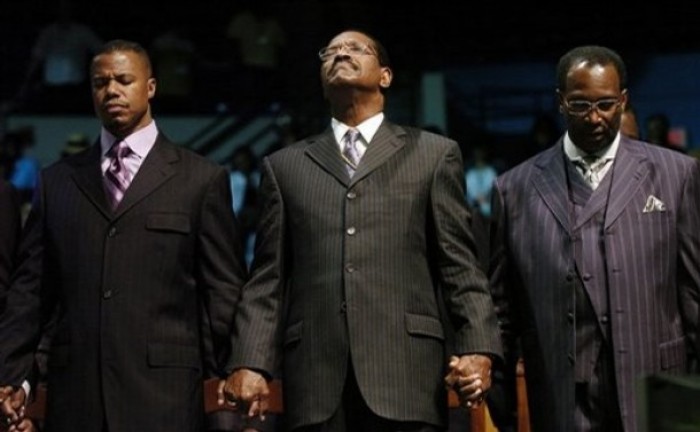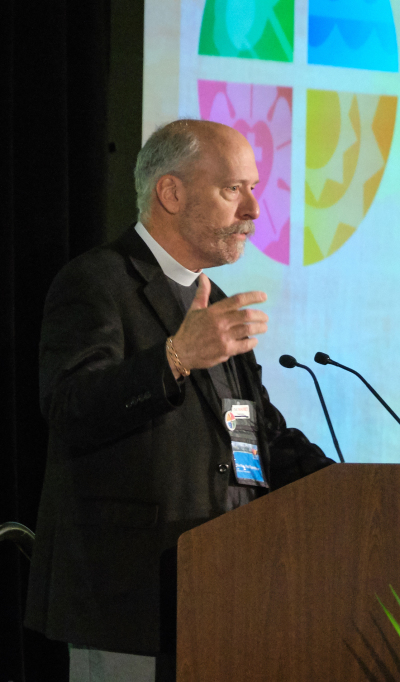COGIC, churches hit hard by coronavirus say they won’t reopen as disease not yet contained

Despite a call from President Donald Trump that governors reopen houses of worship “right now,” churches whose predominantly black and Hispanic congregations have been devastated by the coronavirus pandemic say they will remain closed because the virus has not yet been contained.
The Church of God in Christ, America’s largest Pentecostal denomination with some 8.8 million members who are predominantly black, released a statement Friday in response to Trump’s call, noting that their reopening will be guided by the advice of state and federal public health agencies.
“The past few months have been a season of great difficulty for our nation and our world. The United States has endured several viral pandemics in the previous 100 years. Still, there has never been a time when a viral illness has wrought such a profoundly negative impact on our communities as COVID-19, the Coronavirus,” COGIC, led by Bishop Charles Blake Sr., said.
“The Church of God in Christ family has been no exception. Bishops, superintendents, pastors, and lay members have succumbed to this disease, leaving their families and churches devastated by their untimely passing,” it continued, acknowledging the denomination’s significant loss to the coronavirus which has disproportionately impacted black and Hispanic communities.
The group noted that the CDC and the National Institute of Allergy and Infectious Diseases “admonish us to stay home and to wear appropriate face coverings and engage in social distancing if we absolutely must go out” because containment of the coronavirus, which has killed close to 100,000 people in the United States as of Tuesday morning, has not yet been achieved.
“The CDC and the NIAID have developed mathematical models to monitor the number of newly confirmed cases and deaths resulting from the virus. They have used these models to track the pattern of sickness and death. The data will help them determine when containment has been achieved and when it is safe to resume public gatherings, including church services and other religious activities,” the denomination said.
“The number of new cases and deaths continues to increase. Based on the data available to them, the CDC and NIAID recommend that the present precautionary measures remain in place. We agree and caution pastors to delay re-opening churches at least through the end of June, if not later. Even when regular activity is allowed to resume, it must be done cautiously and methodically in phases.

“Several states have decided to relax restrictions and permit regular activities in defiance of these recommendations. These premature re-openings will once again put tens of thousands of our COGIC saints in harm’s way. We urge you, our pastors, to adhere to the recommendations of the CDC and NIAID and to refrain from prematurely opening your churches and congregating in your buildings before we have credible and substantiated evidence that it is safe to do so."
As the CDC urged religious officials to defer to the directive of state and local governments on Friday, President Trump said in a press briefing that houses of faith, including churches, synagogues, and mosques are “essential services” and called for their immediate reopening.
“Today I am identifying houses of worship — churches, synagogue and mosques — as essential places that provide essential services,” Trump said. “Some governors have deemed liquor stores and abortion clinics as essential but have left out churches and other houses of worship. It’s not right.”
He further threatened to “override” governors if they did not follow his order to reopen churches.
“I call upon governors to allow our churches and places of worship to open right now,” he said. “If there’s any question, they’re going to have to call me, but they’re not going to be successful in that call.”
Bishop Paul Egensteiner, who leads the Metropolitan New York Synod of the Evangelical Lutheran Church in America, told his leadership team in a letter shared with CP that while he agrees that the church is “essential,” churches in his synod would remain closed until more accurate information on the virus is available.
In a recent report by The Christian Post, Egensteiner highlighted how the coronavirus had devastated the synod’s parishes in New York City, particularly those serving Latino communities
“Here at the Office of the Bishop, we received news that President Trump has deemed churches and other houses of worship ‘essential’ and has called on governors across the country to allow these places of worship to reopen this weekend. Meanwhile, New York Governor, Andrew Cuomo, has announced that beginning May 21st, religious gatherings of no more than 10 people will be allowed statewide,” he said.
“We know we are essential, but it is not essential to gather in person at this time. One of our congregations lost over 44 members to the coronavirus crisis. We would like to protect our ministers, lay leaders, members and communities from also experiencing such abundant devastation, loss, and grief. This virus is a silent assassin that cannot be seen; we must protect each other and proceed with caution. We are monitoring this situation so that we may continue to make educated decisions and provide you with accurate information.”
Miles McPherson, senior pastor of the popular Rock Church in California, also agreed that churches are essential but felt reopening now is premature.
“I am glad that churches are finally being acknowledged as essential. Churches have long been the cornerstone of our communities, from serving the community, to being a place for people to gather and worship God, to honoring lost loved ones. The community often turns to their local church in a time of need. No one can find ‘hope’ in the aisle of a department store or by sitting in a restaurant. Churches specialize in offering hope and spiritual support through prayer and counseling. We look forward to churches across the US being able to open again and provide that much needed hope and service to their communities,” he said in a statement to CP.
“As for this Sunday, we need a bit more time to have things in place so that attendees can worship in a socially distant setting. We will continue to follow the County's guidelines implemented during this time. We look forward to worshiping together in person as time permits.”
Other pastors, including Jentezen Franklin of Free Chapel, a multi-site church in Gainesville, Georgia, have praised the push by President Trump calling for the reopening of churches. They argue that it should be left up to the churches, and not government officials, to decide what to do with their First Amendment right.
Rachel Laser, president and CEO of Americans United for Separation of Church and State, called the president’s push for the reopening of all churches in conflict with the advice of public health experts “irresponsible and reckless.”
“President Trump’s demand that governors allow all houses of worship to reopen this weekend is irresponsible and reckless – and tragically, will lead to more deaths. Trump’s cynical pandering to his religious extremist base is putting the health and well-being of the American people in jeopardy,” Laser said in a statement Friday.
“Decisions about how, when and if houses of worship can offer in-person services must be left to state and local public health officials who are familiar with the unique situations they face. President Trump has no power to override the nation’s governors in this area. In addition, the Constitution’s religious freedom protections prohibit the government from granting special privileges to religion that cause harm to others. Accordingly, we call on state officials to ignore Trump’s dangerous demand."
The CDC acknowledged in a statement Friday that while gathering in person is important for religious communities, it may not always be feasible and churches should listen to the guidance of the public health leaders in their localities.
“Gathering together for worship is at the heart of many faith traditions. Because there are several published reports of COVID-19 outbreaks sparked by large gatherings, both non-religious and religious in nature, the recommendations released today will help guide faith communities while respecting their fundamental right to gather for worship,” the health agency said.
“Implementation should be guided by what is feasible, practical, and consistent with the needs and religious beliefs of each community. Decisions and strategies on reopening are implemented at the state, tribal, local, and territorial levels based on their phased reopening plan. Each locale is different, and individual jurisdictions have the authority and local public health data and information needed to protect their communities without discrimination against religion.”
A new report from the Skagit County Public Health Department in Washington state, recently published by the CDC, shows how quickly the coronavirus spread after a choir practice became a “superspreader event” for the disease that infected 86% of attending members and killed two of them.
Catoosa Baptist Tabernacle, an independent Baptist church led by Pastor Justin Gazaway in Ringgold, Georgia, that restarted in-person services on April 2 while following social distancing guidelines, was also forced to suspend those “in-person worship services for the foreseeable future” on May 11 after learning several families had contracted the virus.




























